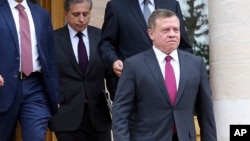Jordan's King Abdullah II will be able to deliver an Arab consensus on Mideast peace when he meets with President Donald Trump at the White House on Wednesday, after a recent summit hosted by the monarch renewed an Arab offer of recognition of Israel in exchange for Palestinian statehood.
Could the revived Arab plan, coupled with Trump's stated eagerness to strike a deal, signal an opening for restarting stalled Israeli-Palestinian talks?
Here's a look ahead.
What's on the table?
At their annual summit last week, Arab leaders renewed an offer they first made to Israel in 2002 - recognition by dozens of Arab and Muslim nations in exchange for allowing the creation of a Palestinian state in the West Bank, Gaza Strip and east Jerusalem. Israel has balked, among other things, at the envisioned scope of withdrawal from the lands it captured in 1967 and unsuccessfully sought to renegotiate the initial proposal.
With the summit declaration to back his case, Jordan's king will be able to tell Trump that Arab leaders are serious about achieving what Jordan's foreign minister, Ayman Safadi, described as the "historic reconciliation between Israel and the whole Arab world."
But the king will couple the enticing prospect of regional peace with a warning. Jordan argues that the decades-old Israeli-Palestinian conflict remains at the root of regional turmoil and that, if allowed to fester, it will undercut the Trump administration's Mideast goals of containing Iran and defeating Islamic State extremists.




